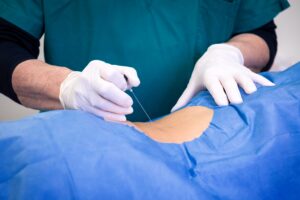Spine surgery is a major procedure that can be an effective treatment for many spinal conditions, including herniated discs, spinal stenosis, and degenerative disc disease. However, the recovery process after spine surgery can be long and challenging. It is important to take the recovery process seriously and to follow my recommendations in order to achieve the best possible outcome.
Follow Instructions
You will be provided with a list of dos and don’ts, including restrictions on activities, medication recommendations, and exercises. It is important to follow these instructions closely to avoid complications and to ensure a successful recovery.
Rest and Avoid Lifting Heavy Objects
Rest is essential during the first few weeks after spine surgery. You should avoid lifting heavy objects, twisting, or bending during this time. It is recommended that you not lift more than 5 lbs during this time. That is less than a gallon of milk. The total length of time to adhere to these rules will differ depending on the type of surgery you had.
Stay Hydrated and Eat A Healthy Diet
Staying hydrated and eating a healthy diet is important for your overall health and for a successful recovery. Drinking plenty of water can help to reduce inflammation and promote healing. A healthy diet that includes fruits, vegetables, lean protein, and whole grains can provide your body with the nutrients it needs to heal.
It is normal after surgery to not be very hungry, and even have some throat irritation. This is because during the surgery, depending on what part of the spine we are working on, your head might be tilted forward so that we can access the affected area. This will put a strain on the muscles and tissues in your throat. Another reason is the use of a breathing tube during anesthesia. This tube, although necessary, can cause irritation to the throat lining. These will disappear, but you should start with soft foods and liquids until you feel ready to move on to more solid meals.
Take pain medication as prescribed
Spine surgery can be painful, and you will likely be prescribed pain medication to help manage your pain. It is important to take your medication as prescribed and not skip doses. If you experience side effects, such as nausea or dizziness, talk to us about adjusting your medication. It is also recommended that you avoid non-steroidal anti-inflammatory drugs, such as aspirin, as it impairs bone fusion.

Start physical therapy
Physical therapy is an important part of the spine surgery recovery process. Your physical therapist will provide you with exercises to help strengthen your core, improve your range of motion, and promote healing.
Stay active
While rest is important during the first few weeks after surgery, it is also important to stay active. Your physical therapist will provide you with exercises you can do at home to help improve your strength and range of motion. Walking is also a good way to stay active and to promote healing. You should try and walk for a total of 30 mins a day. It does not have to be all at once, you can work your way up to it. A few short walks throughout the day will suffice until you build your strength. It is also important to avoid climbing stairs if possible.
Get enough sleep
Getting enough sleep is important for your overall health and for a successful recovery. Your body needs time to rest and heal, and getting enough sleep can help to promote healing. Use pillows or cushions to support your spine while you sleep, and try to get at least 8 hours a night.
Don’t smoke
Smoking can delay the healing process and increase the risk of complications after spine surgery. If you smoke, it is important to quit before surgery and to avoid smoking during the recovery process.
Stay positive
Recovering from spine surgery can be both a physically and emotionally demanding process, but it is important to stay positive. Focus on the progress you are making and the goals you have set for yourself. Celebrate small victories along the way and don’t be too hard on yourself if you experience setbacks.
Follow Up Appointments
Follow-up appointments after spine surgery are essential for monitoring the progress of your recovery and ensuring that there are no complications. During these appointments, I will assess your range of motion, strength, and pain levels, and make any necessary adjustments to your treatment plan. I may also recommend additional tests or imaging to check on the healing process. Additionally, follow-up appointments provide an opportunity for you to ask any questions or raise any concerns you may have about your recovery. By attending these appointments, you can ensure that you are on track for a successful recovery and address any issues early on before they become more serious.

Partners in Your Spine Surgery Recovery
If you’ve undergone spine surgery, it’s crucial that you attend all scheduled follow-up appointments. My team and I are committed to providing compassionate care and have extensive experience helping patients with their spine surgery recovery.
With over 20 years in the field, I understand the challenges that come with this process and will work with you to create a personalized plan that meets your unique needs. With our focus on patient education and ongoing support, we can help you achieve a successful recovery and improve your quality of life. Contact us today to learn more about our services and how we can assist you in your spine surgery recovery journey.
















